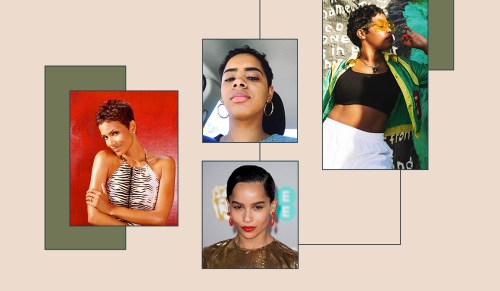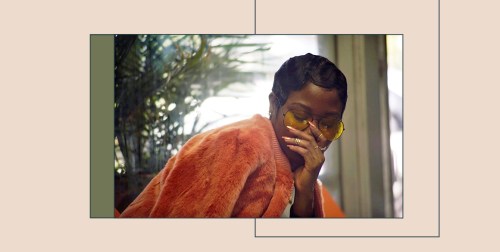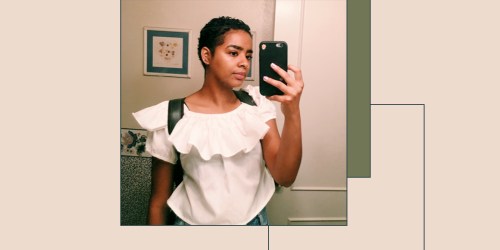How the Iconic Pixie Cut Redefined How These Black Women View Beauty
The pixie cut is synonymous with Black beauty, and women who have had a pixie speak to its impact on their definition of beauty.

When I think about Black beauty, I think about how timeless and innovative it is. I think about the fact that it’s the blueprint to everything from new products to trends in the beauty industry and throughout mainstream society today. Images of Lil’ Kim’s iconic looks from the ’90s and early 2000s live rent-free in my head, and so does the iconic pixie cut, which, in my opinion, is synonymous with Black culture and Black beauty.
Experts in This Article
Kim Kimble is a Los Angeles-based hairstylist.
Not only is it a timeless look, but it’s radical and it challenges European beauty standards that make Black women feel that in order to be deemed beautiful, they have to have long hair and be in close proximity to whiteness.
The pixie cut took off amongst women of color when they started seeing entertainers like Halle Berry and Toni Braxton sporting it, according to Kim Kimble, celebrity hairstylist, founder of her eponymous hair-care line. “I think women just wanted something stylish,” she says. “When they saw Toni and Halle rocking the short hair and how good they looked, I think it gave them, the courage [to cut their hair] and they wanted to look like that.”

“It feels classic to me…it’s almost nostalgic, too, because I think about the ’90s, Black ’90s stars like Nia Long, like Jada [Pinkett Smith]. I think about Toni Braxton,” says Laci Jordan, a Los-Angeles based artist who says Braxton, Long, and Rihanna—”women who hold the torch in confidence and sexiness”—inspired her to get a pixie cut.
She experimented with different hair lengths throughout college and had reached a point where she was experiencing breakage and decided to cut her hair. “I would do shaved sides and keep it longer in the middle so I could do braids and shaved sides, or I’d do like a bowl cut type of pixie thing.”
But no matter what styles she experimented with, she always felt bored with them, and would eventually go back to the pixie because it made her feel more free and expressive, and she didn’t have the weight of thinking about her hair. “I knew I was made for a pixie,” she says.
Over the past year, Jordan experienced challenging life events, explaining that “everything just felt super heavy.” So in December 2020 when she went back home, she decided to get a pixie again. “I was like, I just want to release all the stress and anger and sadness and things that I had in 2020 and really just start 2021 with a fresh start…and I’ve been so happy.”
The pixie has helped her feel more confident, more self-assured, happy, and back to herself. “This time, at the space that I am at in my life, I mentioned just building my self-confidence up, growing myself into the woman that I’ve always wanted to become, it fits where I am in my life. I think it fits the energy that I want to carry for the rest of my life,” she says.
The confidence Jordan exudes has also shaped her overall sexiness, she says. “If I can be so free and edgy and loose with my hair, then my outfits and [other] stuff tend to follow that.”

Growing up, Jasmine Corrales says she didn’t have the “traditional” Black girl hair experience, such as getting her hair braided and adorned with beads. “I had wanted a pixie cut for a super long time, but I feel like my mom had this attachment to my hair, almost more than me,” she says.
Corrales, who was inspired by Zoe Kravitz and Rihanna, wanted to change her hair because she typically wore it in a slicked-back bun, and more importantly, “I wanted to be able to feel pretty without my hair,” she says. Similar to Jordan, the pixie was freeing for Corrales in a multitude of ways. “I was always relying on my hair to be the anchor of if I felt pretty that day or not. If my hair looked good, I felt good, and I feel like cutting it off, I had to just be like ‘Well, my hair looks like this every day, so do I feel pretty on my own?”
For Black women, hair isn’t just hair. It’s a way to express ourselves, it’s an extension of our personalities and who we are. Both women who I spoke with tell me that by cutting their hair, they feel more connected to and at peace with who they are. It’s also redefined how they view their beauty internally and externally and beauty in general.
“Beauty is whatever makes me feel like myself and not self-conscious,” says Corrales. “I feel like now it’s more in myself and what I’m bringing rather than external.”
“I knew there was a version of me that I was pretty much trying to meet up to that was actually the confident person everybody else would see…I think anybody can pull off damn near anything if they have a certain level of confidence and swag about yourself,” Jordan says.
And as for her how she defines beauty, the cut, and maturity, have shown her that beauty is internal. “I feel like I’ve set my own beauty standards for myself and what I want to see and what I want to do…This is me, I’m never turning back.”
Want even more beauty intel from our editors? Join Well+Good’s Fine Print Facebook group (and follow us on Instagram) for must-know tips and tricks.
Sign Up for Our Daily Newsletter
Get all the latest in wellness, trends, food, fitness, beauty, and more delivered right to your inbox.
Got it, you've been added to our email list.








